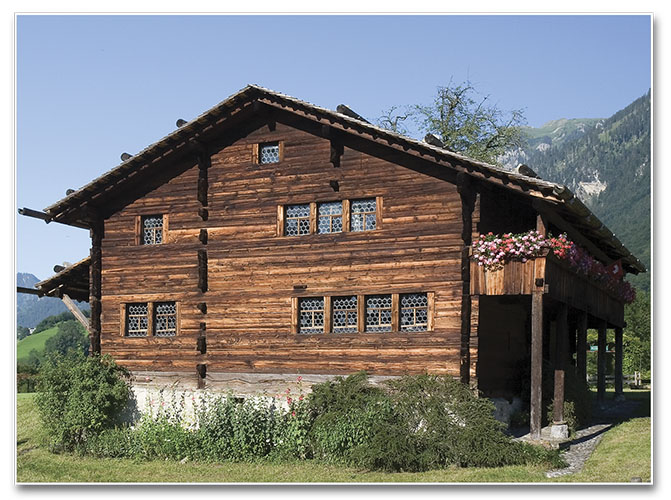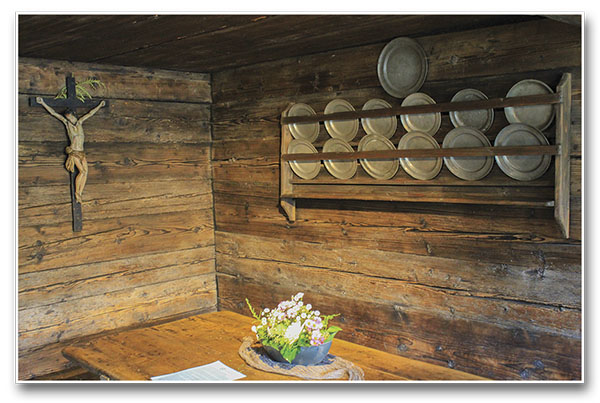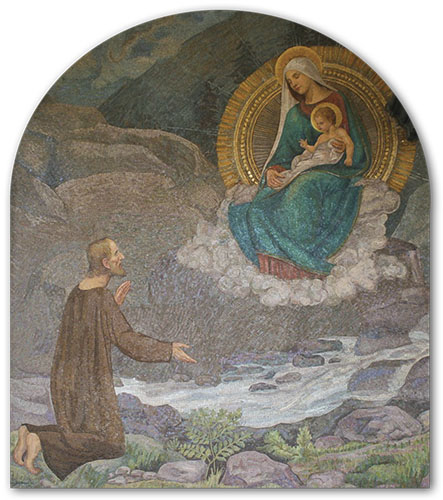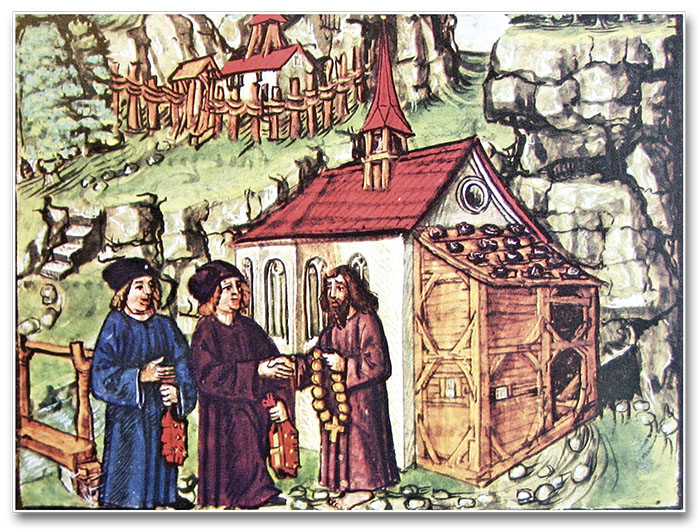Spectacle for Angels and Men- St. Nicholas of Flüe
Father of a family, military man and influential judge, this singular saint had his eyes continually turned towards Heaven, without ever neglecting the fulfilment of his concrete duties.
The Swiss Alps: a superbly enchanting, joyous and peaceful landscape. On one of the slopes of the beautiful cliffs, a shepherd blows his horn to gather his herd. The sun is already setting. In the village, some distance away, the bells of the Angelus are ringing. The man stands in a praying position for a few minutes, turned towards the sound of the pealing bells. After concluding his prayer with a ceremonious Sign of the Cross, he moves slowly towards the stable to watch over the animals.
His is an arresting figure: tall and thin, to the point of appearing to be made only of skin and bones, with a tanned complexion, resplendent with cleanliness. His hair, marked by the passing of the years, is of a dark grey tone. His beard descends in an orderly fashion from his chin in two well-formed tufts. From this countenance, it is chiefly his gaze that stands out: deep, serene and energetic. In spite of his grave appearance, his overall demeanour is marked with a remarkable note of simplicity.
Whoever observes him carefully realizes that, although he is engaged in herding, his personality has something uncommon about it, proper to someone of advanced learning and superior intellect; moreover, his gestures and way of being are typical of a man skilled in the art of war.
What role will this curious character play amid the poetic mountains in the heart of Switzerland?
Love of contemplative life and, above all, God’s will
His name was Nicholas, and he was born in March 1417. He was a native of Unterwalden, which shortly afterwards would form, with other cantons, the present-day Swiss Confederation.
Although his parents were simple farmers, they tried to provide him with an education far superior to that generally given a farm boy. ive farmer.
From a very early age, the boy showed lucid and unusual intelligence, as well as admirable piety. Family and friends admired his temperament so inclined to meditation, and from an early age he was graced by mystical visions that invited him to do so. On the other hand, he mortified himself with great seriousness, imposing such fasts and penances upon himself that his mother became concerned that such rigours would harm his health.
Although strongly inclined to the religious and contemplative life, Nicholas wanted above all to do the will of God. He married Dorothée Wyzling, a girl of exemplary character and piety, with whom he had ten children. The thorough religious and moral formation that the numerous offspring received from their father was crowned with his own example, for, although married, Nicholas continued to love recollection and prayer. This is illustrated by a custom witnessed by his eldest son, who recounted that his father used to arise at night to pray, while everyone was sleeping.1
A valiant soldier and promoter of peace
Today’s Switzerland, which has long been divided into small provinces, was at that time in a critical and decisive historical period. The regions that composed it, called “cantons”, were practically independent from each other and were subject to the contested influence of neighbouring countries, such as France, Germany and Italy, which were fighting – sometimes through diplomatic means, sometimes by war – to gain the sympathy of the Swiss people, in order to annex land, obtain soldiers and increase their power.

As a result, the young Nicholas was called to arms three times: in 1436 and 1443, to fight in the conflict that history would call the Old Zurich War, and finally in 1460, in the Thurgau War.

In addition to being an excellent soldier, Nicholas revealed a remarkable diplomatic talent on these occasions, helping to establish peace between the cantons and the consequent formation of the Swiss nation.
One detail, however, should be stressed: he always fought with a sword in one hand and a rosary in the other, thus demonstrating the true courage of the Catholic in face of difficulties and enemies.
It is worth noting that it was at this time that the Swiss began to be recognized as notable warriors, to the point of supplying mercenary troops to a considerable part of Europe. A noteworthy example is what happened in January 1506, when 150 Swiss guards arrived in Rome, passed through the Porta del Popolo and went to St. Peter’s Square, where they were blessed by Pope Julius II. This solemn entry into the Eternal City constituted the official foundation of the Pontificia Cohors Helvetica, the famous Swiss Guard, which would choose St. Nicholas of Flüe as one of its official patrons.
Crowned with merit, he remained humble
At the end of each of these wars, Nicholas returned home. Far from giving himself over to a quiet and mediocre life, enjoying an agreeable family life in a selfish way, he placed himself at the service of his fellow citizens, guiding and helping them in every way that he could. Such was his wisdom and balance in solving the questions that were presented to him that, on one occasion, they wanted to make him mayor, but he refused, alleging the simplicity of his origin. Besides renouncing the glories of the world, he thus showed his respect for the higher-ranking people of the canton, whom he sincerely believed to be more leaned and better equipped for governing.
What an example of unpretentiousness! Indeed, the acts in the lives of the Saints are founded on humility, the mother of all virtues. What pride denies and destroys, humility reaffirms and consolidates.
However, at the insistent requests of the people, he eventually accepted the offices of cantonal judge and town councillor, through which he continued to exercise pious and exemplary influence in the region, with invariable kindness, charity and conscientious discernment.
According to his oldest biographers, Nicholas resigned from these public offices after an unfair trial in which his energetic interventions had no effect on the other judges, who were rigidly biased and issued a fraudulent sentence.
A message from Heaven
While carrying out his various activities as a father, soldier and judge, Nicholas’ main concern was to be perfect in virtue and to meditate on the supernatural mysteries, to which he was drawn by the mystical visions that never left him throughout his life.
Feeling called by God to a level that was more angelic than human, he began to dedicate himself to shepherding, using the quiet hours in the fields to raise his mind to heavenly realities, allowing himself to be absorbed by them in his inner tabernacle.
One day, while he was tending the flock, he mystically saw a marvelous lily issuing from his own mouth and rising up to the clouds, but then falling to the earth and being devoured by a horse. Nicholas understood that this was a message from Providence: his life was still taken up by excessive material cares. God wanted to bring him closer to Himself, and for this purpose to grant him graces, but human concerns soon forced him to return to earth and abandon contemplation.

It is encouraging to know that a Saint experienced such difficulties, which are common to anyone attracted by spiritual things. It is because he relied on divine help, and no doubt had recourse to the intercession of Our Lady, that to this day “Nicholas of Flüe personifies in a wonderful way the harmony of natural and earthly freedom with heavenly and supernatural freedom. In this consists precisely the perfect unity of his apparently manifold and varied life. This is how, being an authentic fifteenth century Swiss and, by his education, his life and his character, a man of the Middle Ages, he is nonetheless worthy to be presented as an example and model for all Christians, especially for the men of our time.”2
The decisive call
However, God was asking St. Nicholas to make a very special commitment, which only became clear to him after much meditation: he was to embrace complete solitude! Thus, he obtained his wife’s consent to live as a hermit, and left her company and that of their ten children, as inspired by the passage from Genesis: “Go from your country and your kindred and your father’s house to the land that I will show you” (12:1). Heaven was to be his only homeland!
Nicholas went to live in a hut whose ceiling was no higher than he was. For years – twenty, according to some authors – he was nourished only by the Holy Eucharist, received once a month.
Despite his remote location, his fellow citizens and family soon discovered him, but they respected his new lifestyle without, however, ceasing to benefit from his virtues. Nicholas was increasingly loved and venerated by those who came to him for advice, prayers and guidance. On some occasions he even had to abandon his beloved solitude to resolve the feuds between the Swiss cantons, as in the negotiations that resulted in the Treaty of Stans signed in December 1481. In this, as in other interventions, peace was re-established thanks to the man now known as the father of the homeland.
The success of St. Nicholas in such missions was impressive, for he prevented bloodshed among Christians and promoting the union of those who should be together under the same standard. Free of any trace of hypocrisy or falsehood, he answered questions in a very simple and punctual manner, with remarkable serenity of soul.
Although there is a certain sentimental notion that a just man never fears death, there have been many Saints who have watched the approach of death with dread, but have sought their comfort in God, and to Him they have delivered up their souls in great serenity. Such was the case of St. Nicholas when he saw his end approaching. Groaning amid atrocious pain, he even exclaimed, “How terrible is death!” However, as a true hero of the Faith, he knew that he was strong because he was united to God and, after piously receiving Viaticum, he quietly exhaled his last breath.
Exemplary in the fight against evil
Visiting the church in Sachseln, a commune in the canton of Obwalden, Switzerland, today, the faithful may contemplate under the altar a silver image within which are preserved the remains of Brother Klaus, so called by his countrymen of the past and present. In former times, it was the custom for Swiss soldiers to place the decorations they had won in battle there. This was a gesture of special nobility and elevation, as Dr. Plinio Corrêa de Oliveira points out: “the hero who removes the decoration from his chest to honour the Saint, his forefather, makes it seem more beautiful to be the posterity of St. Nicholas than to be covered with all the honours of the earth.”3

Raised to the altars on May 15, 1947, St. Nicholas of Flüe became the principal patron Saint of Switzerland where his liturgical solemnity is celebrated on September 25.
A spectacle of love for the Angels and of admiration for men, this exceptional man had his eyes continually turned towards Heaven, without ever neglecting to fulfil the concrete duties that fell to him. May his life be a stimulus to our weakness in facing the state of instability to which we are all subject in this world, and may his untiring struggle against himself and against the internal dissensions of his country serve as a model in the battles against the infernal enemy, for only holiness, of which the Rosary is an inseparable weapon, is capable of standing up to him and transforming history! ◊
Taken from the Heralds of the Gospel magazine, #173.
1 Cf. BAUD, Philippe. Nicolas de Flue. Un silence que fonde la Suisse. Paris: Du Cerf, 1993, p.32.
2 PIUS XII. Address to the Swiss pilgrims in Rome for the canonization of St. Nicholas of Flüe, 16/5/1947.
3 CORRÊA DE OLIVEIRA, Plinio. Um guerreiro perfeito [A Perfect Warrior]. In: Dr. Plinio. São Paulo. Year XXI. No.240 (March, 2018); p.30.
